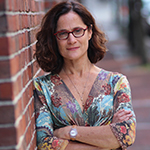Director, MIT Press
 Please tell us a bit about yourself (e.g. hometown, current locale, course of study).
Please tell us a bit about yourself (e.g. hometown, current locale, course of study).
I grew up on the Upper West Side of Manhattan and stayed there for college, attending Barnard/Columbia, where I studied linguistics and computer science. I then went to MIT for graduate school (PhD in cognitive science).
Describe some of your current responsibilities, and what type of organization you belong to.
I just began a new role, as Director of the MIT Press. The Director leads the Press’s initiatives in all areas of development, from traditional content acquisition through innovative technologies for delivery of ideas to a worldwide audience. I see my main responsibility as creating a working environment in which everyone at the Press feels supported to do their best work.
What was your first scholarly publishing role? How did you get that job? What path led to your current position?
I got my first job in publishing in the early 90’s, as an acquisitions editor at Lawrence Erlbaum Associates, a psychology publisher. I was in the midst of a postdoc at the University of Pennsylvania, and realized after a couple of years that I was more interested in the big questions in my field rather than in very focused research. A colleague suggested I give academic publishing a try so I made the leap and was very happy I did.
If there was a pivotal moment or key person in your career development, please describe briefly.
Once I knew publishing was where I wanted to be, I decided MIT Press was the ideal place for me. I was fortunate to be hired in the mid 90’s as a cognitive science editor by Frank Urbanowski, then Director of the MIT Press, and Harry Stanton, the founder of Bradford Books, which had become the cognitive science imprint of the Press. Both Frank and Harry were wonderful mentors.
What tools, web sites and organizations do you find most valuable for your career development?
Several years ago I co-founded a local networking organization for women, call the Boston Women in Information Network, or BWIN. BWIN’s regular meetings continue to a very valuable professional development resource for me and others in the group.
What are some of the surprises/obstacles that you’ve encountered during your career?
I was surprised to find several years ago when I moved into a high-level university administration position that, even with my years of seniority and my doctorate, there was a strong status divide between faculty and non-faculty. I found I couldn’t remain in an environment in which all contributions were not given equal voice and consideration.
What do you wish you knew more about?
I’ve often wished I was a whiz at spreadsheet manipulation and analysis, but I haven’t yet found the time to perfect those skills.
What advice would you give to people interested in a career in scholarly communications?
Whatever occupation you choose, the surest way to get where you want to go is the informational interview. Arrange conversations with people whose work you find interesting in order to learn more about them and what they do. Most people are happy to talk about themselves and to help out someone who shows genuine interest in their work.
https://www.linkedin.com/in/amybrand
https://scholar.google.com/citations?user=0K-BmpQAAAAJ

